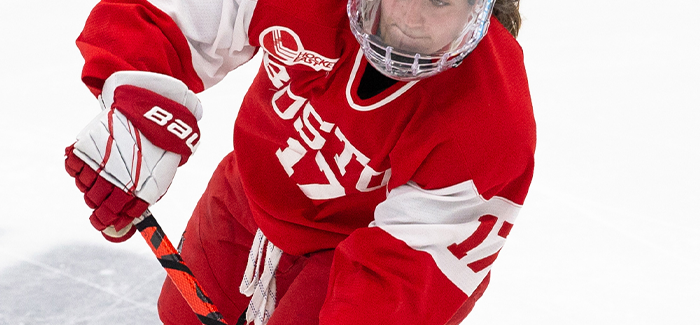Breanna Scarpaci grew up in the game of hockey, hailing from Washington, Michigan. A puck-moving defender who ascended to the Division 1 level, Scarpaci will play her rookie professional season in the PWHPA this winter. A former Boston University Terrier, Scarpaci is staying in New England as a member of the New Hampshire Regional Training Hub.
Prior to heading east, Scarpaci played two seasons at the High School level with Shattuck St. Mary’s Prep. In her final season, 2015-16, Scarpaci scored 23 points (5 g, 18 a) in 61 games. The next season, she was patrolling the blueline at Walter Brown Arena.
Scarpaci played from 2016-2020 with Boston University. Over the course of 138 games, Scarpaci scored 24 points (3 g, 21 a) and provided the Terriers with steady play. In 2019-20, she helped BU emerge as an elite team in Hockey East. The Terriers finished second in the conference with a record of 24-8-4 (18-6-3 Hockey East), but suffered a disappointing Quarterfinal loss at the hands of Maine.
‘The Women’s Hockey Tribune’ recently caught up with Scarpaci to discuss how she got into the sport of hockey, her decision to join the PWHPA for the 2020-21 season, her favorite on-ice memories and more!
WHT: What drew you to the sport of hockey as a young girl, and what fueled the passion that has led you on a very impressive career?
BS: When I was really little, I actually was a figure skater. My older brother played hockey and I think as soon as I saw one of his hockey games, that was it. I was obsessed with the sport. It didn’t take much begging for me to exchange my white skates for some black ones!
As for what got me this far in my career, I would say a lot of support. My family always, always, always supported me and told me that I can do anything I set my mind to. I really did believe it, and I think that’s what keeps me going after all these years.
WHT: What drew you to the PWHPA? What about the organization’s goals and values stood out to you?
BS: What drew me to the PWHPA was definitely what the organization stands for. Growing up, when I would say “I’m a hockey player,” the conversation would always lead to questions like “what are you going to do after hockey?,” because there was never a way to pursue the sport as a career that earned enough pay to solely play hockey. There was an obvious inequality between men and women’s hockey, and I’ve always had a passion to bridge that gap.
WHT: How has your experience with the PWHPA been so far?
BS: Well, the world is a very unsettling place right now with the current pandemic. So with that being said, my experience thus far has been great. Jayna Hefford and the key members have been more than accommodating and working tremendously hard behind the scenes to make this a fluid process for the players, coaches, and everyone else involved.
WHT: I always like to ask this question because the answers can vary so much, what is your favorite memory in the sport of hockey?
BS: That’s a tough question! I have so many great, great memories that the sport of hockey has given me. I guess the most recent memory that comes to mind is winning the Beanpot at Boston University during my junior year in 2019.
It was the first time BU won as a varsity program (yes, that means we were in a 30+ year drought)! It meant a lot to our team and staff, but also to our alumni, student body, and university as a whole. It was a time that our team was truly put in the spotlight, and all our hard work was finally acknowledged. It really meant a lot to everyone involved.
WHT: What are some of your goals both personally and for the region as a whole this coming season?
BS: As a region the goal is to win, of course. Looking at the bigger picture, as in every member of the New Hampshire region and the PWHPA as a whole, the goal is to spread and grow the game of hockey for the next generation of girls. That’s why I think the organization is so great!
The PWHPA gives talented women a platform to play hockey and challenge not only ourselves, but the world to address the inequalities that we have all faced growing up. We are here to bridge these differences and to leave the game of hockey better than we found it for the next generation of girls. Honestly, I think if we achieve that, that’s just as satisfying as winning.


